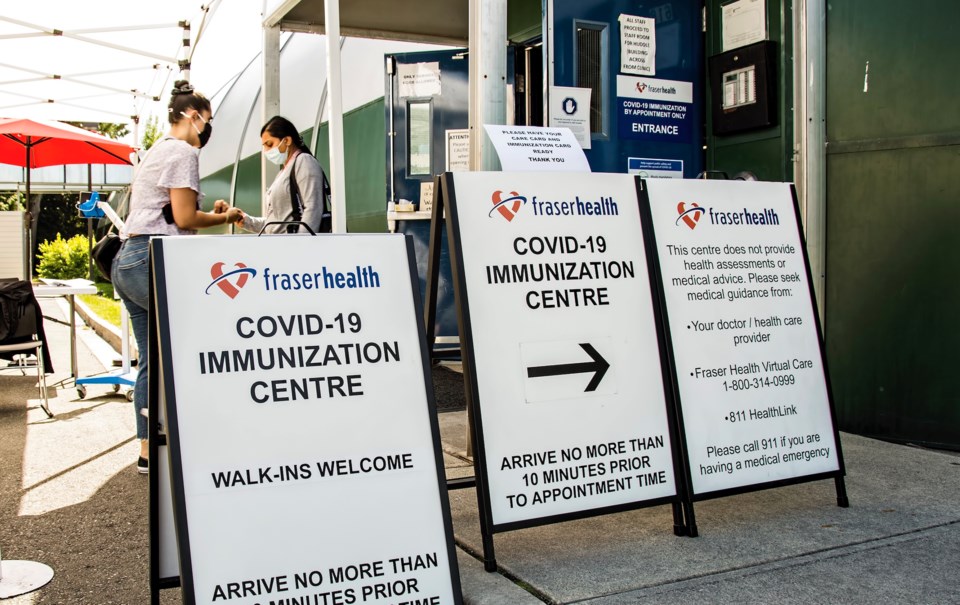The number of new COVID-19 infections in B.C. continues to spike, with 402 cases identified in the past day, pushing up the total number of people actively fighting the disease to 2,066.
This is the first time that the province's daily total of new infections has topped 400 since May 21, and the first time that the number of active infections has topped 2,000 since June 8.
The vast majority of new COVID-19 cases in the province are believed to be the Delta variant, which has shown to transmit much more easily than previous strains of the virus. This is likely one of the causes for the recent spike in cases.
The vast majority of those actively battling COVID-19 have been told to self-isolate, although 58 are in hospitals, with 21 of those in intensive care units (ICUs). Health officials were not aware of any new COVID-19-related deaths.
More than 97.4%, or 147,510, of the 151,375 people known to have contracted COVID-19 in B.C. are considered by the province to have recovered because they have gone 10 days after first feeling symptoms, and are therefore thought to not be infectious.
Provincial health officer Bonnie Henry and Health Minister Adrian Dix earlier today encouraged B.C. residents to get vaccinated as soon as possible, and touted the success of what they called "Walk-in Wednesday," yesterday, when all vaccination centres across the province accepted walk-in traffic, with some having extended hours.
The event's success may prompt calls for this to be standard practice every day.
Yesterday, 7,628 people received first doses of vaccine. That compares with an average of 4,314 people getting first doses of vaccine in the seven previous days. Another 25,618 British Columbians yesterday received needed second doses of vaccine.
The B.C. government said that the total number of first doses provided yesterday was the highest since July 10, which was a day for which no data has been provided. The last single day for which data was provided in which the number of first doses was higher was July 7, when 12,587 people received their first jab of vaccine.
The number of those who received second doses has been on the decline, in part because the population of vaccinated people needing second doses has been on a steep decline.
In total, provincial data show 3,785,216 British Columbians have had at least one dose of vaccine, with 3,172,287 people being fully vaccinated, with two doses of vaccine.
The government estimates that this translates into 81.7% of the eligible population being vaccinated at least once, and 68.4% of the eligible population being vaccinated twice.
The B.C. government's most recent estimate of the province's total population is 5,147,712, so that means that slightly more than 73.5% of B.C.'s total population has had at least one dose of vaccine, and 61.6% of the province's total population has had two doses.
Neither Henry nor Dix have yet given a clear answer on whether B.C. will mandate that all visitors to nightclubs, restaurants or entertainment venues be vaccinated.
"We will not be denying people essential services based on their vaccination status," Henry said, leaving the door open to potentially mandating a controversial vaccination-pass system for entry to social venues.
Premiers in Manitoba and Quebec have said their provinces will issue vaccination cards. Details are being worked out for exactly which non-essential services will be open only to cardholders. Laws requiring vaccination passes to enter restaurants, museums and sports arenas have prompted large protests in European countries, such as France and Italy.
Dix sounded as though his staff is investigating the viability of such passes.
"We are pursuing all options to address the transmission of COVID-19," Dix said.
"I would say to everyone, 'No, you're not obliged to get vaccinated in B.C., or anywhere else in Canada, but there are consequences if you don't,' and I think everyone will have to understand that."
The B.C. government took action last week to mandate that people wear masks in inside public spaces in the Central Okanagan.
This was largely because B.C.'s Interior Health region is the hot spot for new and active cases.
Here is a breakdown of where the 402 new COVID-19 infections in B.C. are, by health region:
• 82 in Fraser Health (20.4%);
• 41 in Vancouver Coastal Health (10.2%);
• 234 in Interior Health (58.2%);
• 20 in Northern Health (5%);
• 25 in Island Health (6.2%); and
• no one who normally resides outside B.C.
The 2,066 active infections, broken down by health region, include:
• 449 in Fraser Health (21.7%);
• 290 in Vancouver Coastal Health (14%);
• 1,121 in Interior Health (54.3%);
• 67 in Northern Health (3.2%);
• 127 in Island Health (6.1%); and
• 12 people who normally resides outside B.C. (0.6%).
There remain five seniors' living facilities with active COVID-19 outbreaks:
• Kootenay Street Village in Cranbrook;
• Cottonwoods Care Centre in Kelowna;
• Brookhaven Care Centre in West Kelowna;
• Holyrood Manor in Maple Ridge; and
• Nelson Jubilee Manor in Nelson.



